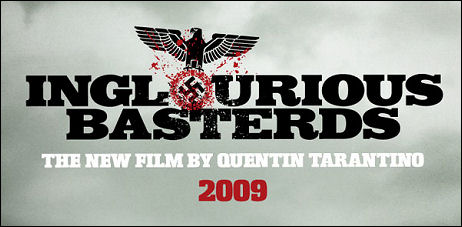In the view of the Observer‘s Ryan Gilbey, “the early years of Quentin Tarantino‘s career” — Reservoir Dogs, Pulp Fiction, Jackie Brown, his screenplays of True Romance and Natural Born Killers, his pinch-hitting screenplay work on Crimson Tide — “were the most dynamic by a long chalk.”

Which makes it understandable why “some of us are eager to know what happened to the Tarantino who gave U.S. cinema a hefty adrenaline shot to the heart, much like the one administered to Uma Thurman‘s Mia Wallace.
“Perhaps the very act of expecting Tarantino to mature and evolve, or to return to the tenor of his early work, is like waiting for Wim Wenders to make a frathouse comedy. It could be that he wanted all along to devote his career to paying homage to hacks and trashmeisters. Will the chasm continue to widen between the qualities that made Tarantino’s first three movies so fascinating and the shameless, sometimes juvenile passions that drive him on?
Gilbey ends by writing that “perhaps those of us who hailed Tarantino as a cinematic revolutionary will find further support for our case this month in Cannes” — i.e., when Inglourious Basterds shows its face,
Hah! Unless it’s been transformed to something almost entirely different from what’s on the page, Inglourious Basterds is going to be, at best, an ironic World War II wankathon — a movie with a semi-sincere middle section that has a reverent, film-loving Cinema Paradiso vibe but is otherwise about archness, smugness and smirk. But in a way that kind of works. On paper, that is.
Here’s what I wrote last July after reading the first half of the script:
“While it’s easy to see why others have called it Kill Bill meets The Guns of Navarone meets The Dirty Dozen meets Cinema Paradiso, I have to say that I’m mainly enjoying it as a violent, vaguely art-filmy World War II attitude comedy — a deliberate exploitation piece full of war cliches turned on their ear, and a general theme of Jewish payback upon Nazi swine for the Holocaust.
“It is absolutely the most inauthetic, bullshit-spewing World War II movie that anyone’s ever written. And I love it for that. Every other line is a howl or a chortle. It almost could have been written by some 15 year-old suburban kid who used to play pretend WWII games with his friends when they were 10 or 11. Four or five times I literally laughed out loud, and that’s rare for me. And every scene is pure popcorn, pure shit-kickin’ Quentin, pure movie poontang.
“When I read the character name of ‘Pvt. Butz,’ a German combat soldier, I almost fell out of my chair. This is straight out of the mind of Stanley Kubrick when he called two hotel-clerk characters in Lolita ‘Mr. Swine’ and ‘Mr. Putz.’
“The Inglorious Basterds script flaunts its fakery and movie ‘tude to such a degree that it’s pure adolescent (i.e., teenage boy) pleasure. The Europe it depicts doesn’t exist and never will exist, and that’s totally fine. The German and French characters are so idiotically cliched they almost sound like the kind of material that a John Candy SCTV skit would use. But not quite. It’s actually kind of perfect that way. The balance, I mean.
“The script seems twice as fake as the Italian villlage in Blake Edwards‘ What Did You Do in the War, Daddy?, and that was pure mid ’60s Hollywood bullshit. It’s faker than Hogan’s Heroes, even. If Tarantino has done any research about France, Germany or any World War II particulars other than watch World War II movies, I’ll eat my motorcycle tool kit.
“He doesn’t care, of course, and that’s why he’s Quentin Tarantino You can feel him in his element, living in his head and flaunting a clever, dumb-ass yarn that entertains every step of the way, and — this is the cool part — in a kind of oddly sophisticated fashion. Which is what he’s been doing since Pulp Fiction.”
But the ’92 to ’97 period is over, and none of us can go home again.
